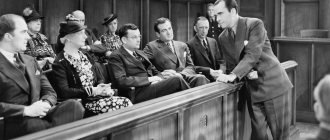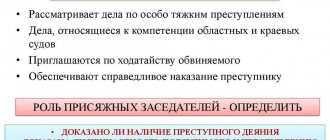Features of compilation and the number of citizens who can be included in the register of jury candidates
Lists of jurors are created based on information about voters generated on the single resource of the State Automated System “Elections”. The software randomly selects surnames. After data processing is completed, the list of candidates is transferred to the regional level with subsequent publication in the media.
According to Art. No. 4 Federal Law No. 113 (new edition 2022) The highest court in the region of the Russian Federation carries out the formation of reserve and main lists once every 4 years. The number of individuals in the registers is established by the executive body or the head of the local entity.
Basic
The number of jurors in the court is selected by random selection. At least 7 days before the preparatory hearing, invitations are sent to selected citizens. If the number of people who responded is less than required, then resampling is carried out. That is, the board will be formed until the required number of assessors is reached.
At the preparatory hearing, the main list of candidates is compiled. The presiding judge, lawyer and prosecutor take part in this process. Participants have the right to reject one of the applicants without justifying their choice. After approval of the main register, members of the board take an oath.
Watch the video: “Jurors are now in city and district courts.”
Spare
The number of citizens for reserve lists of candidates for the position of jury is no more than 1/4 of the total register of candidates approved at the level of the constituent entity of the Russian Federation. The statement is compiled by the head of the administration of the locality or district in which the executive branch is permanently located. This register includes only those people who have a permanent residence address at the location of the district court.
When selecting applicants to participate in the proceedings of a criminal case, it is necessary to ensure strict compliance with Article No. 326 of the Code of Criminal Procedure of the Russian Federation (with the latest amendments and additions in 2020). The main selection criterion is that an individual cannot participate in several legal proceedings within 1 calendar year, regardless of the authority. According to current legislation, summons to a jury is permitted only once for a period not exceeding 10 working days.
Frequency of compiling the register of candidates
A local government body can create lists of candidates for jury service no more than once every 4 years. This applies equally to both the main and backup registries. In addition, the compilation of a general list of candidates is subject to a similar rule.
Jury verdict
When the active phase of the hearing ends and all participants have spoken, the judge poses a series of questions to the jurors to which they must answer. Here they are:
- whether the prosecution was able to prove that the act occurred;
- whether the prosecution was able to prove that it was the defendant who committed it;
- whether the guilt of the defendant is obvious.
Private questions may also be asked to clarify the details of the qualification of the act. In addition, the question may be raised as to whether the defendant deserves leniency.
Jurors questions during deliberations. To do this, a vote is held in which no one has the right to abstain.
Based on the voting results, the following are issued:
- guilty verdict if the majority of jurors voted in the affirmative on all 3 questions;
- jurors answered negatively on at least one question
Next, the verdict is announced in the courtroom in front of all participants in the process.
Criteria for applicants
Based on Article 3 of Federal Law No. 113, the selection of applicants for assessors must comply with the rules established in the Code of Criminal Procedure of Russia.
The following categories of the population cannot be called upon to perform civic duty:
- if the person is not in the age group of 25+ years;
- there is an unsealed criminal record, or the person is involved in a criminal case as a suspect or accused;
- assigned the status “incapacitated”;
- mental abnormalities – there is a medical report;
- drug addiction, confirmed by a certificate from a dispensary;
- the presence of physiological deficiencies that may interfere with participation in legal proceedings.
Basic principles of jury trial.
At the time of approval of the lists, this information for each participant is checked. However, a citizen also has the right to recuse himself, including unmotivated one.
Procedure and time for creating a register of candidates
According to Article 5 of Federal Law No. 113, for a period of at least 3 months. Before the completion of the terms of office of candidates for the collegium of assessors, chairmen of judicial bodies must submit updated lists.
Such authorities include:
- Russian Armed Forces;
- regional organs;
- regional municipalities;
- departments of federal cities;
- autonomous region and districts.
Potential jurors are determined by software in a random order using an automatic method through the GAS “Elections” system, the creation of which was decided by the President in 1994 according to Decree No. 1723.
This register contains personal information of individuals participating in election campaigns and referendums. Exclusion from jury lists in the courts of the Russian Federation is carried out on the basis of Art. No. 3 part No. 2 of the current law.
The procedure for approval of the list of board members by the executive department for the region of the Russian Federation:
- Sending notifications to citizens registered in the territory of the subject of the location of the court.
- Within fourteen calendar days, people on the register must familiarize themselves with the invitation.
- Consideration of applications received from potential applicants.
- Checking applicants for compliance with selection criteria.
- Making adjustments and eliminating inaccurate data about citizens included in the general jury register.
- Drawing up and approving the list of board members.
Procedure and grounds for removing an applicant from the lists of assessors
Composition of the jury.
Based on Article 7 of Federal Regulation No. 113, there are criteria by which citizens are deleted from previously compiled registers of people’s judges. The highest executive body revokes the right to sit during the consideration of a criminal case.
But this happens if the following circumstances become known:
- The occurrence of a situation provided for in Art. No. 3 part No. 2 Federal Law No. 113.
- The person independently submitted an official petition regarding the existence of circumstances according to which he cannot perform the function of assessor in court:
- lack of skills in Russian or another language in which the criminal case is considered;
- establishing a diagnosis that prevents the performance of duties - availability of supporting documents (medical certificate);
- reaching 65 years of age;
- a citizen holds a public office or an elected position in a municipality;
- serviceman;
- dismissal from service under a contract from the FSB, security agency or foreign intelligence, including within 5 years from the date of this event.
In addition to the above reasons, the applicant has the right to submit an application if he is raising a minor child under 3 years of age. Self-recusal is also allowed without specifying a motive, but only on the condition that no oath was taken.
How the jury list has been shortened
In 2016, Federal Law No. 190 came into force, on the basis of which a number of provisions in various legal acts underwent changes. The updates are presented in the form of a set of measures aimed at achieving a compromise between the interests of the state and the public. One of the types of amendments adopted on 01/01/18 was the number of jurors in court.
The change in the composition of candidates for assessors consists of reducing them. District authorities and garrison authorities require the participation of 6 people. To form a board in 2020, 12 representatives from the people are enough. Only 8 citizens will be called up to a higher department if there are at least 14 candidates.
Previously, before the 2016 reform, in the process of considering a criminal case, there were 12 members of the board, which were formed from 20 applicants.
Punishment for a person convicted by a jury
If a verdict of not guilty is returned, the defendant is released from custody in the courtroom, and the jurors may be seated, but the trial itself continues; during it, various organizational issues are clarified.
After a guilty verdict has been rendered, the trial also continues; the jurors have the right to remain in the room. Next, the court decides on the specific type of punishment in the current situation. The fact that the defendant is recognized as deserving of leniency is taken into account - this is reflected when choosing the type of punishment. The outcome of the consideration is the imposition of punishment.
Features of selection
The procedure for selecting applicants is subject to strict rules specified in the current laws of Russia. Every four years, two lists of “applicants” for the position of people’s judges are approved. These registers include only those individuals who meet the selection criteria.
Automated software "Elections" carries out a random search for candidates for jury trials. A person included in such a list may subsequently be summoned to the department to consider a specific case under the articles of the Criminal Code of Russia. If previously the number was set at 12, then with the past reform their composition has undergone changes.
Formation of a preliminary jury register
The clerk or assistant judge, after setting a trial date, will select jurors for a particular criminal case. Identification for the general and reserve registries is also carried out by random selection.
The court hearing assistant checks whether candidates meet the criteria established in Federal Law No. 113. If circumstances are identified that impede the fulfillment of civic duty, the person is removed from the list.
Applicants for membership in the board are approved in accordance with Article No. 326 of the Code of Criminal Procedure of Russia.
Rules for the formation of jurors:
- It is not allowed to call the same citizen to participate in the proceedings of a criminal case more than once in 12 months.
- After the lists of applicants for membership in the collegium are compiled, a register is compiled indicating the personal form of each candidate. Additionally, the registration address is indicated. The approved list is signed by the assistant to the presiding judge.
- Preliminary selection allows you to weed out citizens who do not meet the criteria for jury service. The list may be supplemented if there is an official statement from the applicant about self-recusal.
- During the week, people who have passed the preliminary selection are sent an invitation to attend the meeting. The date, time and place are indicated.
The number of jurors in court and the formation of the panel depending on the court
How is a jury formed?
Adopted in 2016, the reform reduced the number of jurors as participants in legal proceedings at the regional level and equivalent courts. Previously, the board consisted of 12 members; in 2022, only 8 representatives from the people appear. It is noteworthy that in district courts and garrison military authorities this list has been reduced to 6 people.
However, the updates affected not only the number of assessors, but also expanded the jurisdiction of the cases under consideration.
Criminal proceedings for which it is permissible to initiate a trial with a jury include the following provisions of the Criminal Code of Russia:
- Art. No. 105 part No. 2;
- article No. 111, part No. 4;
- Art. No. 228.1 part No. 5;
- Art. No. 229.1 part No. 4;
- Art. No. 227;
- Art. No. 295;
- Art. No. 317 No.
- Art. No. 357.
For these criminal cases, the selection of members of the board consisting of 6 main and 2 reserve members is provided. Legal proceedings are carried out at the district and military levels.
The algorithm for forming a board is prescribed in Article No. 328 of the Code of Criminal Procedure of the Russian Federation.
The table shows the norms and values on the basis of which it is established how many jurors there should be in court, depending on the instance:
Table 1.
| Organ name | Note | Number of people on the board |
| Regional and equivalent courts | Previously – 12 people | 8 assessors |
| City, district and military departments | Before the adoption of reform 8 | 6 + 2 spares |
| Higher authority | Before the changes, 12 members out of 20 applicants | 8 people are selected from at least 14 candidates |
Jury duties do not include trial of criminal cases involving defendants who have not reached the age of majority.
Belyanin M. V. “Duty or right to be a juror”
Having got a job at the Sakhalin Regional Court as an assistant judge, I became not just an eyewitness, but also a participant in the first trials in the Sakhalin Region with the participation of jurors. I was in fairly close contact with the jurors, answering their questions about the organization of the trial. But this was preceded by one more stage - the calling of about 50-70 candidates for jurors, for them I had to give a short lecture about what a jury trial is, what the candidates should do and what the function of the jurors themselves will be in resolving a criminal case.
More than 15 years have passed since then, but our citizens are no more informed about jury trials, other than becoming more confused by the endless television court shows that have little to do with the reality of a trial.
In this article, I would like to combine my past experience as an assistant judge and the present experience of a lawyer and tell citizens what a jury trial is, who can be a juror, what tasks a juror faces during the trial, and I will also try to provide information for reflections on what it is to be a juror - an honorable duty or a right of a citizen.
So, first, let's define what a jury trial is. A jury trial is an institution of the judicial system consisting of a panel of jurors, randomly selected only for a given case and deciding questions of fact, and one professional judge, deciding questions of law.
Citizens of the Russian Federation have the right to participate in the administration of justice as jurors when courts of first instance consider criminal cases within their jurisdiction with the participation of jurors. Restrictions on this right are established only by federal law. The Federal Law “On Juries of Federal Courts of General Jurisdiction in the Russian Federation” defines participation in the administration of justice as jurors of citizens included in the lists of candidates for jurors as a civic duty. In his interview with Rossiyskaya Gazeta, President of the Federal Chamber of Lawyers of Russia Yu. S. Pilipenko, Fr.
One of the most frequently asked questions from citizens who received an invitation to court was: “Why me, why am I being called?” So how can you become a juror? First, you become a candidate for jury service. This happens as follows. Every four years, the executive and administrative body of a municipal formation compiles a list and a reserve list of candidates for jurors of the municipal formation, including in the said lists citizens permanently residing in the territory of the corresponding municipal formation. In addition, the highest executive body of state power of a constituent entity of the Russian Federation, every four years, on the basis of lists and reserve lists of candidates for jurors of municipal entities, represented by the heads of municipal entities, compiles a general and reserve list of candidates for jurors of a constituent entity of the Russian Federation. The list and reserve list of candidates for jurors of a municipal formation are published in the media of the municipal formation and contain only the surnames, first names and patronymics of candidates for jurors.
Having learned that you are included in the list of candidates for jurors, you have the right to apply to municipal authorities or the executive body of state power of a constituent entity of Russia to remove you from the specified list in cases where you do not meet the following requirements: you have not reached the compiling lists of candidates for jurors aged 25 years; have an outstanding or unexpunged criminal record; recognized by the court as incompetent or limited in legal capacity by the court; are registered with a narcological or psychoneurological dispensary in connection with treatment for alcoholism, drug addiction, substance abuse, chronic and protracted mental disorders.
In addition, you can file a statement about the existence of circumstances that prevent you from performing your duties as a juror if you are:
a) a person who does not speak the language in which the proceedings are conducted;
b) a person who is unable to serve as a juror due to health reasons confirmed by medical documents;
c) a person who has reached the age of 65 years;
d) a person holding government positions or elected positions in local government bodies;
e) military personnel;
e.1) a citizen dismissed from military service under a contract from the federal security service, state security agencies or foreign intelligence agencies - within five years from the date of dismissal;
f) a judge, prosecutor, investigator, investigator, lawyer, notary, bailiff service official or private detective - during the period of professional activity and for five years from the date of its termination;
f.1) with a special rank as an employee of internal affairs bodies, customs authorities or bodies and institutions of the penal system, and for 5 years if you are dismissed from these bodies;
g) a clergyman.
Citizens suspected or accused of committing crimes also cannot serve as jurors.
Probably the second most popular question from citizens regarding jurors is: “What will happen to me if I just don’t go to court?” Despite the fact that, as a lawyer, I am interested in the participation of citizens in the administration of justice in court with the participation of jurors, for the sake of objectivity I must mention that, in accordance with Art. 327 of the Code of Criminal Procedure of the Russian Federation, a candidate for juror receives the status of a juror after being included in the list of jurors. By virtue of Part 3 of Art. 333 of the Code of Criminal Procedure of the Russian Federation for failure to appear in court without a good reason, a juror may be subject to a monetary penalty. However, at present, the liability of a candidate for jury duty for failure to appear in court is not provided for by the legislation of the Russian Federation. Thus, if you fail to appear in court as a candidate for jury, you will not incur any liability, whereas if you are elected as a juror, for failure to appear in court without a good reason, you may be subject to a fine by the court in the amount of 2,500 rubles. Despite these circumstances, citizens should be aware that the failure of a candidate to appear as a juror leads to negative consequences, in the form of disruption of the trial, postponement of the consideration of the case for a long period, which in turn entails the long-term detention of the defendant until a verdict is passed.
After a court hearing is scheduled, candidates for jurors are selected from the general and reserve lists in the court by random sampling, and a preliminary list is compiled indicating last names, first names, patronymics and home addresses.
So, what awaits you in court if you meet all the above requirements and are a conscientious citizen who has decided to fulfill his civic duty.
Lists of juror candidates who appeared at the court hearing, without indicating their home address, are handed over to the parties to the trial (prosecutor, lawyer, victim, defendant).
The judge gives a brief opening statement to potential jurors in which he tells you what type of criminal case is being tried, tells you how long the trial is expected to last, and explains your tasks as a juror.
Candidates for jurors are required to truthfully answer questions asked of them, as well as provide the necessary information about themselves and their relationships with other participants in criminal proceedings. After this, the presiding judge questions the candidates for jurors about the presence of circumstances that prevent their participation as jurors in the consideration of the criminal case. Each of the candidate jurors who appeared at the court hearing has the right to point out the reasons that prevent him from performing his duties as a juror, as well as to recuse himself. At this point, you have the opportunity to be excused from serving as a juror by making an oral or written statement to the court if you are over 60 years of age; you are a woman with a child under three years of age; you are a person who, due to religious beliefs, considers it impossible to participate in the administration of justice; you are a person whose distraction from the performance of official duties could cause significant harm to public or state interests; and also if you have another valid reason for not participating in the court hearing. Also remember that the same person cannot participate in court hearings as a juror more than once during the year. Do not hesitate to clarify the questions of the presiding officer and the parties, since some terms, due to the specifics of legal language, may be understood differently by professional participants and citizens. For example, citizens may perceive the question about an existing criminal record as whether a citizen has ever been convicted by a court, while for lawyers the concept of a criminal record has clear legal consequences and is limited by a time frame.
If the court decides to exempt juror candidates from participating in the criminal case, they are excluded from the preliminary list and removed from the courtroom. After satisfying the self-challenges of juror candidates, the presiding judge invites the parties to exercise their right to a reasoned challenge. The judge provides the parties with the opportunity to ask each of the remaining juror candidates questions related to clarifying the circumstances preventing the person from participating as a juror in the consideration of the criminal case. The parties submit to the presiding officer reasoned written requests for challenges, without making them public. Requested juror candidates are removed from the preliminary list. In the event of a challenge, citizens often perceive this circumstance as painful, as if they had been personally offended. I assure you that the parties in no case, by challenging you with a reasoned or unmotivated reason, do not want to somehow harm your personal qualities, they are only doing their job and identifying those jurors who, in their opinion, can objectively make a fair verdict.
To begin the trial, it is necessary to assemble a jury for district courts consisting of at least 6 people and 2 reserves, and for the court of a constituent entity of the Russian Federation, at least 8 main and two reserve jurors. For those who remember the movie “12”, as well as “12 Angry Men”, it may come as a surprise that we do not have 12 juries in our country, but that is the law. The presiding officer announces the surnames, first names and patronymics of the jurors. The jury is formed in a closed court session. If the materials of the criminal case contain information that constitutes a state or other secret protected by federal law, then the jurors are required to sign a non-disclosure agreement, which in turn may entail certain restrictions for the citizen, for example, when obtaining visas to travel abroad. A juror who refuses to give such a signature is dismissed by the presiding judge and replaced by a reserve juror.
Citizens are called upon to serve as jurors for no more than 10 days. At the same time, this period does not meet the needs of practice, especially in criminal cases where several defendants are involved and the volume of criminal cases amounts to several dozen volumes. In my practice, there were several cases that were tried with a jury for about one year. Therefore, when deciding on the opportunity to participate in court proceedings as a juror, it is necessary to take this circumstance into account.
During the execution of the juror's duties in the administration of justice, the relevant court pays him, at the expense of the federal budget, a compensation in the amount of one-half of the official salary of a judge of this court in proportion to the number of days of participation of the juror in the administration of justice, but not less than the average earnings of the juror at his place main work for such a period. The juror is reimbursed by the court for travel expenses, as well as transportation costs for travel to the location of the court and back in the manner and amount established by law for judges of a given court. During the period of performance of duties for the administration of justice at the main place of work, the juror retains the guarantees and compensations provided for by labor legislation. Dismissal of a juror or his transfer to another job at the initiative of the employer during this period is not allowed. The time a juror performs his duties to administer justice is taken into account when calculating all types of length of service.
During the period of administration of justice, a juror is subject to the guarantees of independence and immunity of judges established by the Constitution of the Russian Federation and Federal Legislation. Persons who prevent a juror from fulfilling the duties of administering justice are liable in accordance with the legislation of the Russian Federation.
If during the trial, but before the jurors are removed to the deliberation room to render a verdict, it turns out that one of the jurors cannot continue to participate in the trial or is removed by the judge from participating in the trial, then he is replaced by a reserve juror. The alternate juror is no less important, since cases of replacement of jurors in practice are very common. There were cases when alternate jurors asked if they could skip, for example, tomorrow’s hearing, saying that I was just a spare. But being on the bench as an alternate is not the same as being on the bench in football. You are not the worst player on the team, with no chance of being substituted. As a lawyer, having worked in jury trials for more than a year, I was very worried that all the jurors would appear at the trial and not have to start the whole process over again due to the disbanding of the jury box due to the failure of one of them. In one of the trials from my practice, the last alternate “replaced” immediately before the verdict was rendered. If you find yourself as a reserve juror, then also be careful during the entire trial, since it is possible that before the most important moment - the verdict, a replacement may be made, and it is you who will decide the fate of the defendant.
The jurors who are part of the board elect a foreman in the deliberation room by open vote. The foreman of the jury directs the deliberations of the jurors, on their instructions addresses the presiding officer with questions and requests, sums up the voting results, draws up a verdict and, at the direction of the presiding officer, announces it at the court hearing. What criteria do citizens use when electing an elder, since this is the first time they are seeing each other? At the beginning of my career, the choice of a sergeant-major sometimes surprised me. The foreman was elected regardless of profession, age, or work experience. I believe that when you are in the deliberation room, electing a foreman, it is still necessary to proceed from the experience of the juror, whether he knows how to lead a meeting, whether he is hesitant to announce the verdict in front of the public, etc.
After the election of the foreman, the jury takes the oath: “When I begin to perform the responsible duties of a juror, I solemnly swear to perform them honestly and impartially, to take into account all the evidence considered in court, both incriminating the defendant and exonerating him, to resolve the criminal case according to my inner conviction and conscience, without justifying the guilty and without condemning the innocent, as befits a free citizen and a just person.”
The presiding judge then explains to the jurors their rights and responsibilities.
Jurors, including reserve ones, have the right to:
- participate in the investigation of all the circumstances of the criminal case, ask questions to the interrogated persons through the presiding officer, participate in the examination of material evidence, documents and other investigative actions;
- ask the presiding officer to clarify the rules of law related to the criminal case, the contents of documents read out in court and other issues and concepts that are unclear to them;
- keep your own notes and use them when preparing answers to questions posed to the jury in the deliberation room.
Jurors may not:
- to be absent from the courtroom during the hearing of a criminal case;
- express your opinion on the criminal case under consideration before discussing issues when rendering a verdict;
- communicate with persons outside the court regarding the circumstances of the criminal case under consideration;
- collect information on a criminal case outside of a court hearing;
- violate the secrecy of deliberations and voting of jurors on issues put before them.
Here I would like to draw attention to the fact that it is necessary to discuss the case under consideration, even with fellow jurors, only after the question sheet has been formed and the jury has retired to the deliberation room to render a verdict. Until this moment, you cannot discuss the circumstances of the case with anyone, even with your neighbor in the jury box. In addition, human curiosity may push you to go and look at the crime scene yourself, or talk to one of the relatives of the victim or defendant. I warn you that all of these actions may become grounds for your challenge and removal from the jury, which in turn may raise the question of disbanding the jury box and starting the trial from the very beginning. The situation looks somewhat comical when you can run into a lawyer in the court corridor and, like a well-mannered person, greet him, to which the lawyer abruptly turns away and retreats. The explanation for this is simple, the lawyer simply avoids any communication with you so that there is not the slightest basis for your challenge and removal from the jury. Don't be offended by us for this, in general, we are quite well-mannered people.
If during the consideration of the case a motion of a legal nature is filed, the jury will retire to the deliberation room and the parties will consider these issues in the absence of the jury. During the day of the trial, this procedure can be repeated several times and the jury should not perceive this as if the parties and the court are hiding something from them; this is a procedure provided for by law, since the functions of a professional judge and jurors are clearly defined by the Code of Criminal Procedure of the Russian Federation.
A trial in a jury trial begins with opening statements by the public prosecutor and defense attorney. The jurors, through the presiding judge, have the right, after interrogation by the parties of the defendant, victim, witnesses, and expert, to ask them questions. Questions are presented by the jurors in writing and submitted to the presiding officer through the foreman. These questions are formulated by the presiding officer and can be dismissed by him as not relevant to the charge. Questions from jurors are very important for the parties to the trial; I admit honestly, I always keep track of which juror writes the questions. From the content of the questions, it becomes clear what circumstances of the case interested the jury, what information they lack to clarify the situation and resolve the case as a whole. Therefore, do not hesitate to write questions, do not think that the participants will clarify everything themselves, your questions are very important. After the end of the judicial investigation and the parties have spoken in the debate, a list of questions is formed for the jurors, which they will have to answer in the deliberation room.
For each of the acts of which the defendant is accused, three main questions are asked:
- whether it has been proven that the act took place;
- whether it has been proven that the defendant committed this act;
- whether the defendant is guilty of committing this act.
After the main question about the guilt of the defendant, private questions may be raised about such circumstances that affect the degree of guilt or change its nature, entailing the release of the defendant from responsibility. If the defendant is found guilty, the question is whether he deserves leniency. Questions that require jurors to make a legal assessment when reaching a verdict cannot be asked. Questions are posed in terms that jurors can understand.
Before the jury is removed to the deliberation room to render a verdict, the presiding officer addresses the jurors with parting words. After parting words from the presiding judge, the jury retires to the deliberation room to render a verdict. The presence of other persons in the deliberation room, with the exception of the jury, is not allowed. With the onset of night time, and with the permission of the presiding officer also at the end of working hours, jurors have the right to interrupt the deliberation for rest. In my practice, there were two criminal cases when the jury did not want to interrupt their deliberations and delivered a verdict late at night, after which, also late at night, we listened to the announcement of the verdict, which consisted of several hundred sheets. Jurors cannot disclose judgments made during deliberations. You can use in the deliberation room all your notes that you took during the court hearing. I strongly recommend keeping notes because, as I said, the trial can drag on and important points that you drew attention to when questioning a particular witness may simply be forgotten by the time the verdict is rendered.
The meeting of the jurors is led by a foreman, who puts questions for discussion in the order established by the question sheet, votes on the answers to them and counts the votes. Voting is open. None of the jurors has the right to abstain from voting. Jurors vote according to the list. The foreman votes last. When discussing the issues put before them, jurors must strive to make unanimous decisions. If the jurors fail to reach unanimity during deliberation for 3 hours, then the decision is made by voting. A guilty verdict is considered accepted if a majority of the jurors vote in the affirmative to each of the three questions above. A not guilty verdict is considered accepted if at least four out of eight jurors and at least three out of six jurors voted for a negative answer to any of the main questions posed in the question sheet. If the votes are equally divided, then the answer most favorable to the defendant is accepted. The question sheet with the answers to the questions included in it is signed by the foreman.
If during the deliberation the jurors come to the conclusion that it is necessary to receive additional clarifications from the presiding officer on the issues raised, then they return to the courtroom, and the foreman turns to the presiding officer with a corresponding request. For example, there was a case in one case where the jury decided to clarify whether they could answer the question about the proof of the event as a whole, indicating “except for such and such circumstances.” After this, the jurors return to the deliberation room to reach a verdict. If during the deliberation the jurors have doubts about any factual circumstances of the criminal case that are essential for answering the questions posed and require additional research, then they return to the courtroom, and the foreman makes a corresponding request to the presiding officer, In this case, the presiding officer may decide to resume the judicial investigation.
After signing the question sheet with the answers to the questions asked, the jurors return to the courtroom. The foreman of the jury passes the question sheet with answers to the presiding officer; after checking it, the judge returns the question sheet to the foreman of the jury for proclamation. If the judge considers the verdict unclear or contradictory, then he points out its vagueness or contradiction to the jury and invites them to return to the deliberation room to make clarifications on the question sheet. The foreman of the jury announces the verdict, reading out the questions posed by the court and the jurors' answers to them from the question paper. Everyone in the courtroom listens to the verdict while standing.
When a panel of jurors renders a verdict that the defendant is innocent, the presiding judge declares him acquitted. In this case, the defendant, who is in custody, is immediately released from custody in the courtroom.
After the verdict is announced, the presiding judge thanks the jurors and announces the end of their participation in the trial. Jurors have the right to remain until the end of the criminal case in the courtroom in places reserved for the public.
The acquittal verdict of the jury is mandatory for the presiding judge and entails his decision of an acquittal. A guilty verdict by a jury does not prevent an acquittal if the presiding judge recognizes that the defendant’s act does not contain signs of a crime.
An indication in the verdict of the jury that the defendant, found guilty, deserves leniency is mandatory for the presiding officer when imposing punishment. If the defendant is found deserving of leniency, the punishment cannot exceed 2/3 of the maximum penalty provided for the crime. Life imprisonment cannot be imposed on a convicted person who deserves leniency.
The introduction of the institution of jurors into the district court system will in any case lead to an increase in the number of acquittals. But at the same time, especially serious crimes are most often punished, because there are often cases when the accused admit their guilt and do not want to be tried by a jury, counting on a more lenient punishment from a professional judge in this case.
The judicial system has long been in need of reform. Today, many citizens do not believe in the independence of judges. A jury trial should help increase Russians' confidence in the justice system. To do this, citizens themselves need to actively participate in the administration of justice while such an opportunity exists. I will assume that if citizens avoid participating in legal proceedings as jurors in every possible way, there will certainly be those who explain this reluctance by citizens’ complete trust in professional judges. This idea will be presented under the guise of excessive organizational hassle and the high cost of a jury trial, and as a result, such conclusions may give rise to the idea of eliminating the jury trial in Russia. Therefore, having received an invitation to court to participate as a juror, think about your civic duty and with the thought: “who, if not me,” appear in court and, in accordance with your convictions and conscience, make a fair verdict as befits a free citizen and a fair person.
Lawyer M.V. Belyanin sakhalinadvokat.rf










